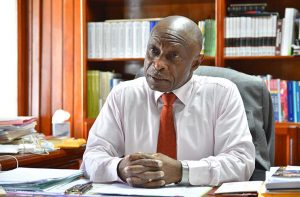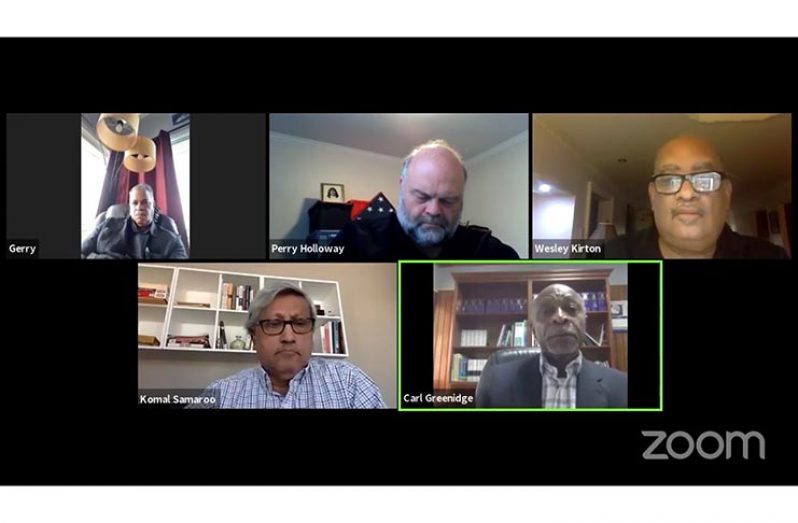….Greenidge tells Town Hall meeting
THE upcoming June 30 public hearing on the jurisdiction of the International Court of Justice (ICJ) to hear the Arbitral Award of 1899 (Guyana v. Venezuela) case, is about the need for Venezuela to adhere to an international treaty it signed on to.
This was the argument put forth by Foreign Secretary, Carl Greenidge, last Saturday, as he cited Venezuela’s refusal to adhere to its obligations outlined in the Geneva Agreement, of which the Spanish country is a signatory.
Greenidge was, at the time, addressing a virtual Town Hall meeting to present an update on Guyana’s quest to bring some finality to the longstanding controversy that exists between Guyana and Venezuela, about the validity of the 1899 Arbitral Award, which delimited the land boundary between the two States.
Attending the meeting was former US Ambassador to Guyana, Perry Holloway; Public Sector Commission (PSC) Chairman, Gerry Gouveia; DDL Executive Chairman Komal Samaroo; and Guyanese American Chamber of Commerce President, Wesley Kirton. Greenidge reminded the meeting that even as Guyana continues to fight for the validity of the 1899 Arbitral Award, the foremost issue at this time was Venezuela’s need to follow its commitment to the Geneva Agreement.

“The issue in the first instance concerns the standing of a treaty and the obligations of the signatories under international law. Both states voluntarily entered into the Geneva Agreement and both agreed to the role of the United Nations Secretary-General in the event of a disagreement over the resolution of the problem,” Greenidge underlined. Signed in 1966, the Agreement to Resolve the Controversy over the Frontier between Venezuela and British Guiana, commonly called the Geneva Agreement, detailed steps for resolution of the border controversy to settle Venezuela’s contention that the “Arbitral Award of 1899 is invalid”.
In January 2018, the Secretary-General of the United Nations, ruled that the controversy between Guyana and Venezuela should be decided by the ICJ.
Venezuela, headed by President Nicholas Maduro, however, has questioned the ICJ’s jurisdiction to hear the matter. Even before the court deals with the case, it therefore needed to rule on its jurisdiction to hear the case. “It concerns the ability of a state to repudiate a treaty because it has a feeling that the benefits it enjoys under it are now not enough and that in spite of its inability to force its will on a smaller neighbour, that neighbour and the rest of the world should allow it to continue this state of destabilisation in perpetuity,” Greenidge said.
The hearing had initially been set for March 23 – 27 but the emergence of the coronavirus pandemic derailed those plans, and it was rescheduled to June 30 by video conference. “In a few weeks, on June 30, we will be given an opportunity to plead our case, based on a magnanimous decision of the Court to go ahead with the case despite the current global crisis. We are grateful for this opportunity. It is an opportunity to which we have looked forward to for decades. Once the Court decides that it has jurisdiction, it will proceed to the merits phase, where the validity of the Arbitral Award will be examined in detail,” Greenidge noted.
The Court required the two countries to provide their arguments on jurisdiction, as a first step. However even in that instance Venezuela has refused to participate and the Court has moved forward with the proceedings nonetheless. “Guyana submitted its arguments on jurisdiction to the Court on the stipulated date… The Court then took the decision to go ahead with the case, always leaving the door open for Venezuela to join the proceedings,” Greenidge reminded.
Guyana seeks to obtain, from the Court, a final and binding judgement that the 1899 Arbitral Award, which established the location of the land boundary between then-British Guiana and Venezuela, remains valid and binding, and that Guyana’s Essequibo region belongs to Guyana, and not Venezuela.
”Venezuela’s contention is that that Award is invalid and as a consequence, the entire Essequibo region, and the appurtenant maritime spaces belong to her. A favourable decision by the Court will be of tremendous benefit to Guyana. Guyana has suffered tremendously over the years at the hands of Venezuela from acts of intimidation, threats of military action, incursions into our sovereign territory and the stymieing of our economic development,” Greenidge said.
He reminded the meeting that the fight to have Venezuela recognise the land boundary has been a long one notwithstanding the Spanish country’s lack of evidence to back its claims. “Since its independence, Guyana has been engaged in trying to persuade Venezuela to provide meaningful evidence of her claim in order to bring the matter to an end. For at least twenty-five of those fifty-two years, discussions took the form of a Good Officer Process, under the aegis of the Secretary-General of the United Nations,” Greenidge noted.
The controversy between Guyana and Venezuela dates back to the 1800s. The borders of Guyana and Venezuela are rooted in the European colonization of the Americas. When tension between Venezuela and Britain emerged in the 1800s, and heightened in the 1890s the United States and Venezuela were united in an alliance against Great Britain. At stake were more than 60,000 square miles of territory that Venezuela claimed on its eastern boundary from the then colony of British Guiana,” Greenidge noted.




.jpg)









